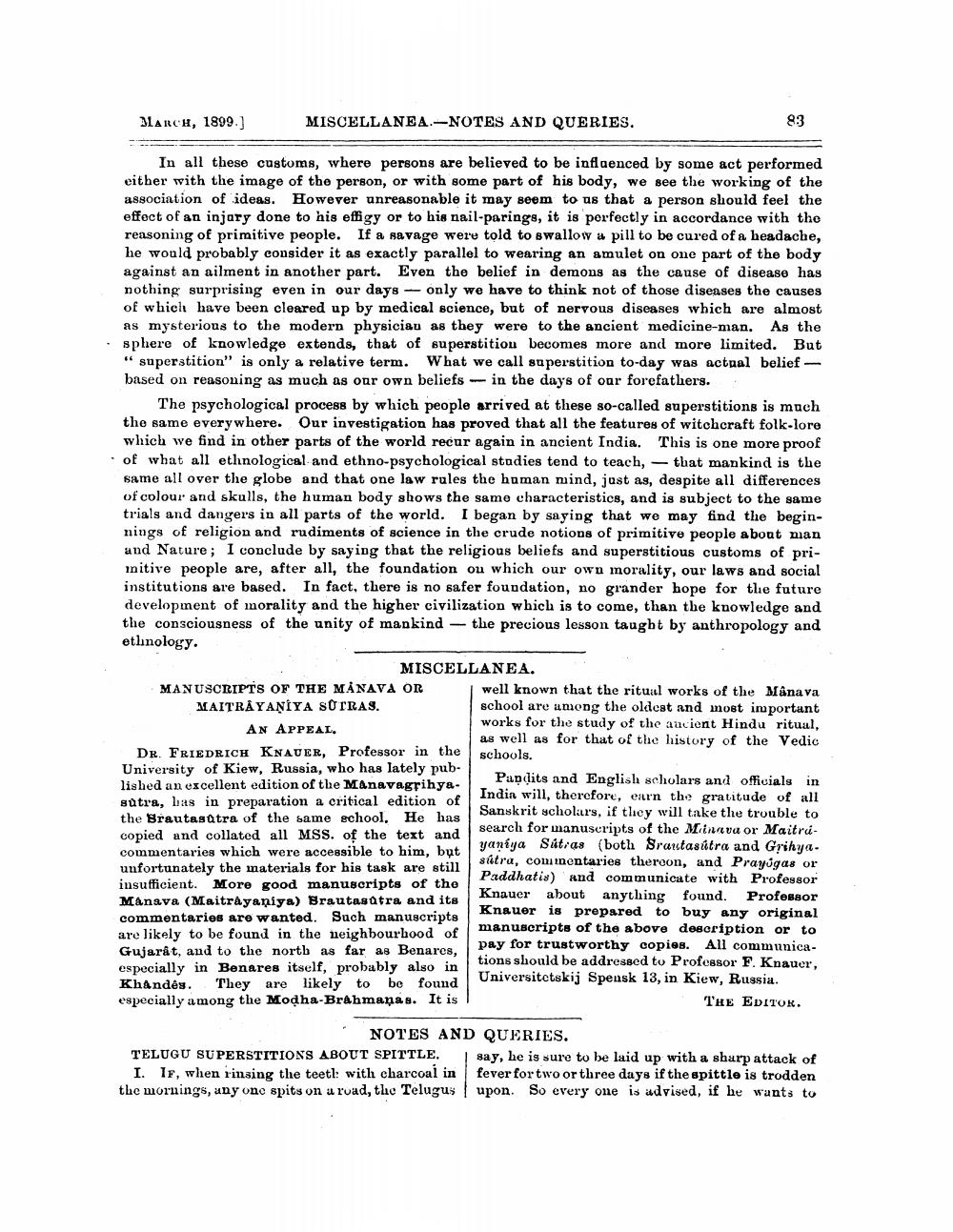________________
MARCH, 1899.)
MISCELLANEA.-NOTES AND QUERIES.
83
In all these customs, where persons are believed to be influenced by some act performed either with the image of the person, or with some part of his body, we see the working of the association of ideas. However unreasonable it may seem to us that a person should feel the effect of an injury done to his effigy or to his nail-parings, it is perfectly in accordance with the reasoning of primitive people. If a navage were told to swallow a pill to be cured of a headache, he would probably consider it as exactly parallel to wearing an amulet on one part of the body against an ailment in another part. Even the belief in demons as the cause of disease has nothing surprising even in our days - only we have to think not of those diseases the causes of which have been cleared up by medical science, but of nervous diseases which are almost as mysterious to the modern physician as they were to the ancient medicine-man. As the sphere of knowledge extends, that of superstitiou becomes more and more limited. But "superstition" is only a relative term. What we call superstition to-day was actual belief - based on reasoning as much as our own beliefs in the days of our forefathers.
The psychological process by which people arrived at these so-called superstitions is much the same everywhere. Our investigation has proved that all the features of witchcraft folk-lore which we find in other parts of the world recur again in ancient India. This is one more proof of what all ethnological and ethno-psychological studies tend to teach, - that mankind is the same all over the globe and that one law rules the human mind, just as, despite all differences of colour and skulls, the human body shows the same characteristics, and is subject to the same trials and dangers in all parts of the world. I began by saying that we may find the beginnings of religion and rudiments of science in the crude notions of primitive people about man and Nature; I conclude by saying that the religious beliefs and superstitious customs of primitive people are, after all, the foundation ou which our own morality, our laws and social institutions are based. In fact, there is no safer foundation, no grander hope for the future development of morality and the higher civilization which is to come, than the knowledge and the consciousness of the unity of mankind -- the precious lesson taught by anthropology and ethnology.
MISCELLANEA. MANUSCRIPTS OF THE MÅNAVA OR well known that the ritual works of the Manava MAITRÀYANİYA SOTRAS.
school are among the oldest and most important
works for the study of the ancient Hindu ritual, AN APPEAL.
as well as for that of the history of the Vedic DR. FRIEDRICH KNAUER, Professor in the
schools. University of Kiew, Russia, who has lately pub
Pandits and English scholars and officials in lished an excellent edition of the Manavagrihya.
Indin will, therefore, earn the gratitude of all sutra, bas in preparation a critical edition of the Brautasatra of the same school. He has
Sanskrit scholars, if they will take the trouble to copied and collated all MSS. of the text and
search for manuscripts of the Miinava or Maitru.
yaniya Sátras (both Srautasútra and Grihya. commentaries which were accessible to him, but unfortunately the materials for his task are still
sutru, comentaries thereon, and Prayigas or
Paddhatis) and communicate with Professor insufficient. More good manuscripts of the Manava (Maitråyaniya) Brautasátra and its
Knauer about anything found. Professor
Knauer is prepared to buy any original commentaries are wanted. Such manuscripts are likely to be found in the neighbourhood of
manuscripts of the above description or to
pay for trustworthy copies. All communicaGujarat, and to the nortb as far as Benares, especially in Benares itself, probably also in
tions should be addressed to Professor F. Knauer, Khåndês. They are likely to be found
Universitetskij Spensk 13, in Kiew, Russia. especially among the Modha-Brahmanas. It is
THE EDITOR.
NOTES AND QUERIES. TELUGU SUPERSTITIONS ABOUT SPITTLE. say, he is sure to be laid up with a sharp attack of
I. IF, when rinsing the teetl: with charcoal in fever for two or three days if the spittle is trodden the mornings, any one spits on a road, the Telugus upon. So every one is advised, if he wants to




